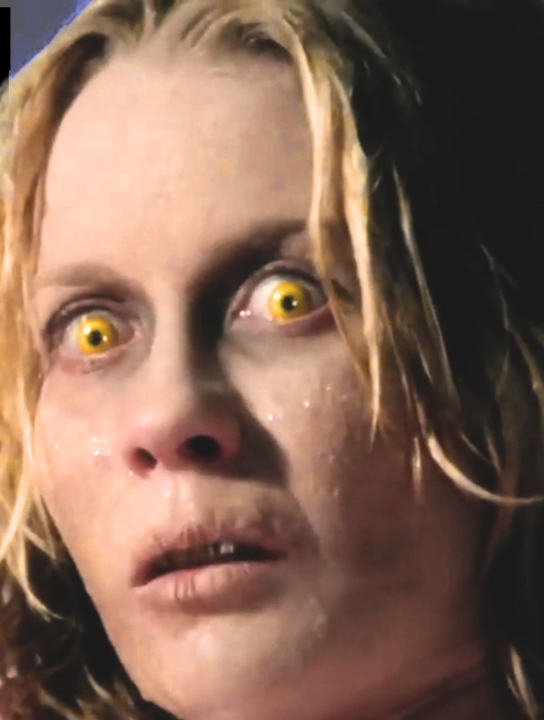When The Exorcist hit theaters in 1973, it was more than a horror film—it was a cultural event. People fainted. They vomited. Some ran straight to their churches. The fear was that real. Even today, many people refuse to watch it. And if you’re reading this, odds are you know someone who still won’t.
So how did Beyond the Door, a low-budget Italian horror film, end up in a courtroom with Warner Bros.? Short answer: it made a 4,000% profit, and that kind of money gets attention—especially when the studio thinks you got it by riding on their pea-soup-splattered coattails.
The Original Italian Release: Spooky, But Honest
In its original form, Beyond the Door was released in Italy as Chi Sei? (Who Are You?). The marketing was creepy, yes, but it wasn’t deceptive. It had its own identity. The story? Sure, it “borrowed” a few things from The Exorcist, but at least the ads didn’t scream “spiritual sequel.”
Enter Film Ventures International: Let the Copying Begin
Things got shady once the U.S. distributor, Film Ventures International, got involved. They retitled the film Beyond the Door and gave it a suspiciously familiar marketing makeover. The new poster? Eerie light from a mysterious doorway. A hidden crucifix in the title typography. Shadows, silhouettes—check, check, check. Side-by-side with The Exorcist poster, it’s not hard to see why Warner Bros. called foul.
And they did—they sued.
What Warner Bros. Claimed
Warner Bros. argued Beyond the Door didn’t just copy their movie’s themes. It copied their entire vibe. From the poster to the trailer to the supernatural effects, they said the film was masquerading as a spiritual sibling to The Exorcist without putting in the work—or the priests.
The court agreed on the marketing front. The crucifix “T”? Banned. The glowing doorway poster? Gone. The judge ruled it was deceptive advertising and amounted to unfair competition.
But Warner Bros. didn’t stop there. They pointed to specific “copied” scenes and techniques, and here’s where things get a little… dramatic.
The Voice of the Devil (and the Courtroom)
Warner claimed Beyond the Door copied their groundbreaking voice distortion—the deep, multi-layered vocal design used for Regan. But voice distortion in horror? That’s horror 101. To suggest they invented that is like claiming you invented thunder because you made a scary sound.
Eye Movements, Projectile Vomit, and Flying Furniture—Oh My!
Next came the eye movement. One eye moves, the other doesn’t. That’s weird, sure—but is it lawsuit-worthy? Warner seemed to think so.
Then there’s the vomit. They claimed Beyond the Door copied The Exorcist’s iconic projectile vomiting. But let’s be real: Jessica’s version? It’s bad. Laughably bad. The effects were so low-budget it looked like someone drew puke on the film strip. The Exorcist made it look supernatural. Beyond the Door made it look like art class.
Warner also claimed the use of telekinesis and levitation was copied. But again… it’s a horror movie. Floating people and flying chairs kind of come with the genre. If they’d won that claim, they’d have sued The Craft for “Light as a feather, stiff as a board.”
That said, Beyond the Door did have one standout moment: the upright levitation scene. No wires, no cuts, just eerie elevation. It’s actually more impressive than the Exorcist scene in some ways. But originality? Still debatable.
So, Who Won?
Kind of a split decision.
The court sided with Warner Bros. on marketing deception—that part was a win. But when it came to the creative elements, the judge ruled those were genre tropes. Horror movies have exorcisms, levitations, and creepy voices. You can’t copyright fear.
Final Thoughts (and a Little Nostalgia)
Today, Beyond the Door still gets slapped with Exorcist comparisons. Some re-releases even use box art that looks suspiciously familiar. And while Warner Bros. couldn’t ban the film itself, they did manage to reshape how distributors approach “inspired by” horror.
So was Beyond the Door a cheap ripoff or just a product of the times? Maybe both. But it’s definitely one of the juiciest “copycat” lawsuits in horror history. And if you’re curious how deep this rabbit hole of Italian knockoffs goes, I’ve got a whole video on Spaghetti Sci-Fi you’ll want to check out.
